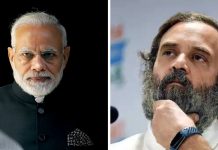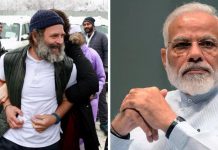
In recent days, with the Ayodhya Ram Mandir construction slated to begin, it is not unusual that chants of ‘Jai Shri Ram’ would ring out — both in a literal sense and in the social media universe. But while many continue to hail Lord Ram with the well-known phrase, others have deviated a tad bit.
In Ayodhya on Wednesday, Prime Minister Narendra Modi began his speech with “Jai Siya Ram”. Hailing the event, he said that “Ram Lalla” who had been living in a temporary tent for years would now take up abode in a grand temple.

Now, just to clarify, both are chants invoking Lord Ram. The invocation of Siya or Sita may be a tad bit less used, but it is by no means an abandoned phrase.
It is both a greeting an invocation and has been used frequently by Hindu nationalist parties including the Vishva Hindu Parishad and the BJP from around the 20th century. Perhaps notably, it is also believed to have rung out at the time of the Babri Masjid demolition. While the chant has been used for many centuries now, perhaps it gained greater visibility with the advent of the Ramayan television series.
Rather bafflingly, however, the phrase became embroiled in a tweeted criticism by BBC South Asia Bureau Chief, Nicola Careem against NDTV journalist Sanket Upadhyay.
The NDTV scribe had cited a news update about how Prime Minister Modi had said ‘Jai Siya Ram’, expressing his happiness at the same. A rather innocuous sentiment, but Careem soon took to Twitter citing the post and noting that this was an NDTV journalist.
“This is an anchor from NDTV, one of the few Indian news channels who have/had a reputation for being close to impartial on most issues,” she wrote.
When one Twitter user tried to point out that this was Upadhyay’s “personal opinion” and that it was “not a shame”, she responded stating that it “depends if you want impartial news or the personal opinion”.
“For you, it is not a shame.”
“My comment was about the exultation directed towards the words of Prime Minister Modi at a moment which will divide opinion in India,” she clarified to another user.
When another user suggested that Upadhyay had been appreciating the use of Sita’s name, Careem was again quick to respond, assuring that she understood the context “very well”.
“It has no baring on my original statement,” she added.
Cannot tell you how happy this has made me. https://t.co/IrVe0KTT3u
— Sanket Upadhyay संकेत उपाध्याय (@sanket) August 5, 2020
This is an anchor from NDTV, one of the few Indian news channels who have/had a reputation for being close to impartial on most issues. https://t.co/ChvfJehmZE
— Nicola Careem (@NicolaCareem) August 5, 2020
If you follow the thread, @sanket expressed happiness at the fact that PM took Sita’s name before Ram but then you don’t become an editor unless you are an opiniated fool @itootweet (sly at you both too) https://t.co/374WaTdl4R
— Shailendra Mohan (@shailendranrb) August 5, 2020
Of course, this begs the question as to whether a person, journalist or otherwise is entitled to personal opinion. The tweet by Upadhyay did not try to link itself to NDTV, although perhaps its an oversight on his part that he had not added the usual disclaimer of how his posts were his personal opinion in his bio.
Many in the comments section expressed bewilderment over what exactly the issue with his post was. And indeed, Careem’s own comments are not illuminating in this regard.
Source: Free Press Journal


































